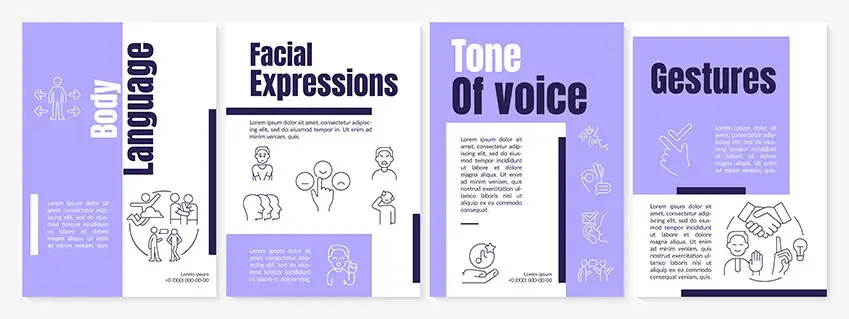
We will notify you once we have something for you
Get the best experience of Shine at your fingertips.
9am - 6pm, Mon to Sat

Have you ever wondered why top leaders have effective communication skills? What impact does good communication make? It lets everyone share their thoughts and concerns in a way that helps the team work well together. In addition, it helps build strong relationships between coworkers, managers, and clients, creating a good vibe at work. This positive atmosphere leads to better teamwork, happier employees, and a workplace that runs smoothly.
Imagine having a conversation where you can clearly say what you mean and get what the other person is saying. That's what good communication is all about! It involves both speaking and listening and even how you use your body to express yourself.
According to a leading job networking site, communication skills are the most in-demand skill in 2024. And guess what? This skill has topped the list for the second year in a row. Henceforth, it is high time to get a strong hold on these skills to flood your inbox with job interview emails.
Keep reading the article to decode some effective tips to improve your communication skills.
Communication skills are important when you're talking to others. It is not just about the words you say, but also how you say them and how you listen. Being able to communicate and comprehend others helps in various situations and promotes good relationships.
All the elements of communication such as verbal and nonverbal communication play an eminent role in the whole process of communication. For example, nodding your head when you agree or disagree is also a way of communication.
Here are some case studies validating the effectiveness and importance of communication skills in the workplace. These will help you in analysing how communication is the fuel to drive business growth.
The success of Google, the renowned multinational company, is attributed to its efficient communication and interpersonal skills. Communication, collaboration, and creativity are some of the highly appreciated and valued in the organization.
Apple, the famous company also appreciates efficient communication and interpersonal skills. Its huge success is attributed to its focus on communication and interpersonal skills. The three values that are most valued in the organisation are:
Simplicity
Clarity
Attention to Detail
Along with this, Apple pays attention to designs that are curated with elegance and simplicity. This again shows emphasis on the visual communication segment.
This airline is known for its engaging slogans such as “Low Fares. Nothing to Hide. That’s Transparency!” Their flight attendants also maintain a cordial approach and nature. It is also greatly appreciated for its customer service.
Effective communication skills are the key to successful conversations. It's all about expressing yourself clearly and listening carefully to others. Imagine it as a two-way street – you share your thoughts, and you also pay attention to what others are saying.
Active listening is a big part of it. That means focusing on the person talking, picking up on what they're saying, and responding thoughtfully. It's like a friendly exchange where everyone gets a chance to speak and be heard.
Being adaptable is important too. It's like changing your communication style based on who you're talking to and where you are. Whether you're chatting with your team or discussing ideas with your boss, adjusting how you talk helps make sure everyone understands.
Empathy is another key. That's about understanding different points of view and appreciating other people's feelings. It helps create a positive and inclusive environment where everyone feels heard and valued.
Lastly, getting better at communication is an ongoing process. It's about learning from your experiences, asking for feedback, and improving over time. By keeping it clear, listening well, and being adaptable, you can build strong communication skills for all areas of your life.

We will share these forms with you as they have a vital role in the communication process.
Written communication relies on written words and includes emails, letters, and reports, offering a tangible record of information exchange.
Verbal communication involves using spoken words to convey messages, allowing for immediate interaction. This type of communication is the art of expressing thoughts, ideas, and emotions through the power of speech.
Non-verbal communication involves gestures, body language, and facial expressions, adding depth and nuance to verbal messages. For example, smiling or frowning are examples of non-verbal communication methods.
Visual communication utilizes images, charts, and graphs, and serves as a powerful tool for conveying complex information.
Remote communication skills are essential in today’s digital era. It ensures proper allocation of the tasks, maintain clarity and conciseness, and not micromanage but have proper management of work. You must choose the virtual communication channels carefully. Another pro tip is to be mindful of your virtual body language.
If you are wondering how to improve your communication skills, here’s the full guide. We will now look at important skills that can greatly affect personal and professional development.
Active Listening
Paying attention to both words and non-verbal signals like body language and tone is crucial for effective communication. It helps you truly understand others' perspectives and encourages meaningful conversations.
For example, when in a meeting actively listening to your colleagues to know the next steps or strategies of a project is a part of effective communication skills.
Clarity and Conciseness
Being clear and to the point prevents confusion. Strong communicators express their thoughts directly, avoiding unnecessary complexity or jargon.
For instance, using the word “clear” is better than using the word “lucid” especially when giving a speech or presentation.
Empathy
Empathy is understanding and sharing others' feelings. Being empathetic helps build strong connections in communication, showing care for others and creating a cooperative atmosphere.
Visualise a situation wherein you have different points of view on a single issue/ project, it is important to gain an in-depth understanding of both sides and then come to a middle ground.
Flexibility
Adapting communication styles to different situations and audiences is key. Adaptable communicators can tackle various social and professional settings easily, enhancing their overall effectiveness.
Flexibility plays a huge role when it comes to catering to different audiences, your language will be different when you are addressing doctors and when you are addressing laymen.
Conflict Resolution
Conflicts are a part of life, but individuals with strong communication skills stand out by skillfully resolving them. This not only promotes harmony but also demonstrates leadership and an adept handling of challenging situations.
For example, if you have a conflict at the workplace, you need effective and good communication skills to find a middle ground. This is an important professional skill that is high in demand. As it is always said being easy to work with is a highly underrated skill.
Feedback Delivery
Providing constructive feedback is an art. Strong communicators deliver feedback in a helpful and motivating way, fostering a culture of continuous improvement and collaboration within a team or organization.
This again plays an important role in the workspace, especially if you are in a managerial position. The way you provide feedback will impact your team’s motivation level and their self-confidence. The feedback should be given constructively without affecting anyone’s sentiments or self-confidence.
Non-verbal Communication
Besides words, non-verbal cues like gestures and facial expressions play a significant role in effective communication. Skilled communicators use non-verbal signals to enhance their spoken messages, making their interactions more meaningful.
The way you react through your facial expressions, and body language conveys a lot about your feelings.
Here are five practical tips that can help you improve these skills that will lead to success in the workplace and other areas of life.
Identify your communication strengths and use them more often in daily interactions.
Request honest feedback from your friends or colleagues to obtain valuable insights.
Focus on specific aspects of your communication style. Use the feedback to pinpoint areas for improvement.
Develop positive habits like eye contact and responsiveness. Practice these habits regularly to make them second nature.
Attend communication-focused classes or workshops. Invest in learning opportunities in communication skills for personal and professional growth.
Participate in meetings, presentations, and social events. Improve your communication by applying your skills in different situations.
While speaking you should try to avoid distraction and getting drifted away from the topic. Also, try to avoid conversational fillers.
In written communication, you should try to create a story that hooks the reader and your target audience.
A good way of improving your communication is to record yourself while speaking this will help you in knowing about the gaps in your pronunciation and communication process.
Highlighting these skills on your resume is key to making a positive impression. Stand out in the job market by placing and tailoring your resume strategically, and highlighting measurable achievements.
As stated above, these are some of the most in-demand skills, so including these in your resume will undoubtedly catch the recruiters' attention.
Strategic Positioning: Place communication skills prominently in the resume summary or objective. Ensure consistent integration throughout the document, emphasizing its importance.
Tailor to Job Requirements: Align these skills with the specific demands of the job description. Use targeted keywords to optimize visibility in applicant tracking systems.
Quantify Achievements: Showcase measurable examples of successful communication experiences. Use action verbs to describe communication-related accomplishments.
Highlight Interpersonal Skills: Emphasize social abilities like active listening and conflict resolution. Provide examples of positive contributions to team dynamics or client relationships.
Technology and Soft Skills: Showcase proficiency in communication tools and platforms.
Add Soft Skills: Integrate soft skills like flexibility and teamwork, which are crucial for effective communication.
The times are changing, and we need to adapt to it to stay relevant in the current scenario. The current digital age needs all of us to adapt accordingly. There is a difference between in-person communication and remote communication.
In the present scenario, various companies have adapted hybrid and remote settings, you need to have proficient communication skills to streamline your workflow and collaborate with team members in remote settings.
The details of the needed skills are as follows:
Digital Literacy: All of us need to get acquainted with various tools and platforms to ensure digital communication. Being digitally literate will involve staying updated with the latest trends, and technologies.
Empathy and Emotional Intelligence: In the era of Artificial Intelligence, empathy, and emotional intelligence are the most-valued skills. That is the main feature that differentiates humans from robots.
Clarity and Conciseness: The digital world means, an overload of information for every topic. You need to know how to structure your content concisely and clearly. You must learn the ways to present complex information in a digestible manner.
Cyber Security Awareness: In the digital world, there is a high risk of cyber threats. Ensuring digital security is an important skill. You must protect your personal information from scams and phishing attempts, and get yourself familiarised with the cyber security measures.
In the corporate workspace, the main challenge faced by the leaders handling remote teams is the fear of making their team members feel left out. They need to ensure that all of them are included in the conversation and that their ideas, and feedback are heard.
The skills that were much in demand in the past years are redundant now. On the other hand, new skills have surfaced over the years. Knowing how to adapt is a major skill, but also, knowing why the trends are changing is important. Check out the list below to know the reasons.
Emergence of AI: The technology is making it easier for professionals to collaborate and structure their messages effectively. This has changed the ways of communication drastically. We know we have travelled from the times of writing letters to writing emails to now texting over social media platforms.
Remote Working: The trend of remote working has also played a key role in revolutionising the face of communication in the workplace. Platforms like Zoom, Teams, Slack, and Google Meet are being used to ensure communication with teams remotely.
Diversity and Inclusion: This is shaping communication in the workplace positively. The awareness of the fact that all voices should be heard and all opinions must be considered leads to an inclusive and collaborative work environment.
Various communication skills are needed in the Marketing, HR, and IT sectors. Here is a detailed list of the skills that you will need in each sector.
Good communication at work makes everything run smoother. It helps teams work together, reduces misunderstandings, and makes everyone feel more connected. Here are some easy tips to make workplace communication even better. The freshers also face hurdles when they join the workplace.
Whether you're part of a small team or a large organization, improving communication skills can lead to increased productivity, stronger teamwork, and overall job satisfaction.
Here are some practical tips to enhance communication in the workplace:
Choose the Right Communication Channel: Different situations may call for different communication channels. While face-to-face meetings are valuable for discussions, quick updates might be more suited to email or messaging platforms. Choose the appropriate method to convey your message effectively.
Encourage Open Communication: You must foster an environment where the team members can easily communicate their thoughts, views, opinions, and ideas. Foster an open-door policy, and actively seek feedback. When employees feel heard, they are more likely to contribute positively to discussions.
Use Constructive Feedback: When providing feedback, focus on specific behaviors and their impact. Be constructive rather than critical, offering suggestions for improvement. This helps in creating a positive and growth-oriented atmosphere.
How to improve my English communication skills?
To enhance English communication skills, identify strengths, seek feedback, develop positive habits, attend relevant classes or workshops, and actively participate in diverse competitions. Consistent practice and learning opportunities contribute to improvement.
Why communication skills are important in a workplace?
Communication skills are important in the workplace for providing clear guidance, developing team collaboration, and resolving conflicts promptly. Effective communication enhances productivity by ensuring tasks are understood and executed efficiently, contributing to the overall success of the organization.
Which jobs require good communication skills?
Good communication skills are essential in a wide range of professions, including customer service roles, sales and marketing, management and leadership positions, and team collaboration-based jobs. Any role that involves interaction with colleagues, clients, or the public benefits from effective communication, enhancing professional relationships, and overall job performance.
What is the importance of Good Communication Skills?
Good communication skills are crucial because they enhance understanding, reduce conflicts, and promote positive relationships. In a professional context, effective communication contributes to successful collaboration, improved teamwork, and increased productivity.
What are the communication skills for presentations?
Some of the prevalent communication skills needed for presentations are listed below: Verbal communication, Visual communication [for presenting data and infographics effectively], Non-verbal communication [Having positive and attentive body language can help you in succeeding further], Storytelling skills, Active Listening
Why are communication skills important in an interview?
Effective communication skills in an interview will enable you to present your thoughts coherently and effectively. In addition, having strong active listening skills will further help you understand the interviewer’s perspective and the job requirements. It shows you high levels of confidence and professionalism.
Which communication skills are important for teachers?
Some of the most needed communication skills for teachers are listed below: Clear and concise communication, Active listening skills, Empathy, Effective communication
How communication skills and soft skills are inter-related?
Having effective communication skills will enhance soft skills such as teamwork, problem-solving, and leadership. Being a good communicator will help you articulate your ideas, resolve conflicts, and strengthen interpersonal skills.


Duration: 51 Hours|Mode: Online

Duration: 20 Hours|Mode: Online

Duration: 41 Hours|Mode: Online